Outlawing theatre activism in Montreal? City attempts new “anti-mask” bylaw
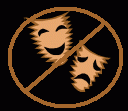
Theatre activists, like actors in a theatre, rely on a gamut of artistic accessories – props, scenery, costumes, make up, and especially masks – to conduct performances on the streets, sometimes during demonstrations. Masks constitute important props in this theatrical arsenal, as they have the power to transform the actor into a different entity, which is then used to convey an activist message through creative performance. Theatre activism troupes such as Vermont’s Bread and Puppet are frequent visitors to Montreal, and mask-performance is integral to their anti-war message.
Amongst the various theatre activism groups based in Montreal, OTL is renowned for using masks constructed from recycled materials. These masks often parody political figures, such as Prime Minister Stephen Harper, and without them it would be much more difficult for OTL players to shed light on oppressions through performance-activism.
Now it appears that the City of Montreal is attempting to create a by-law that would effectively outlaw masks at all political rallies and outdoor demonstrations. Apparently the Montreal police have asked for the bylaw, claiming they want to be able to “identify participants in violent protests”. Ironically, often when masks are worn at “violent protests” it is by the police forces themselves. Officers are known to wear them when impersonating “violent activists”, as in the recent Montebello case where the agents provocateurs were exposed by quick-thinking real protesters.
Exposed for their deceit and attempts at instigating violence while “under cover”, the police admitted to impersonating masked activists.
Police are also known to employ a variety of other types of mask when instigating violence during demonstrations, including gas masks, which are used when attacking protesters with tear gas, and riot helmets, which can conceal identities from the public view while simultaneously intimidating those attending the protest.
The question arises as to why the police are allowed to use masks indiscriminately, whereas protesters will not be allowed to do so under the proposed new bylaw. In addition to theatre activists needing masks for their critical performances, other protesters often use masks when necessary, such as gas masks for protection when tear gas has been fired by the police.
Claude Dauphin, chairperson of the Montreal public-security committee, is trying to assuage fears that the bylaw will violate the Charter-entrenched right to Freedom of Expression by claiming allowances would be made for religious face-coverings and for masks during the winter to keep warm. While there was no mention of theatrical masks used by theatre activists, Dauphin suggested that the police were mainly concerned about ski masks, a strange contradiction given that a ski mask can definitely be considered as winter gear.
Luckily for theatre activists and other demonstrators, civil-rights lawyer Julius Grey is following the case closely, looking for parts that might be considered unconstitutional. Freedom of Expression falls under Section 2 (b) of the Canadian Charter of Rights and Freedoms, and suggests that everyone has the fundamental right to “freedom of thought, belief, opinion and expression, including freedom of the press and other media of communication.” Banning masks can easily be seen as a violation to freedom of expression; in the case of theatre activism, the mask-ban amounts to artistic censorship.
In Copenhagen, Denmark, police have employed a similar ban on masks, much to the consternation of theatre activist groups such as the Danish Clown Army, who have worked hard to save activist buildings and neighbourhoods from destruction and gentrification. The activist community of Christiania is currently threatened by gentrification and is occupied by round-the-clock riot police, and the Ungdomshuset, an activist youth cultural centre, was demolished after a right-wing church bought it and evicted the youth, much to the anger of activists. Ironically, despite the ban on wearing masks, the police insisted that the demolition workers destroying the historic cultural centre wear masks – in order to conceal their identites.
The real danger is that Montreal police are trying to prevent masks from being used properly – for theatre activism – and are instead insisting on their sole right to use them oppressively – to impersonate activists and instigate violence, to conceal identities, to protect themselves from the chemical weapons being deployed against activists, and to intimidate the very people who are fighting for social justice, the end of oppression, and a better world for everyone. In making these demands, it is evident that the police want to control the theatre on the street, which makes it much more difficult for theatre activists to exercise Freedom of Expression and carry out their critical performances that challenge oppression. In effect, the bylaw would empower police to arbitrarily arrest anyone wearing an accessory on their face or head during a demonstration, and as such could lead to instances of intimidation and abuse. In fact, this is exactly what happens in New York City, and professor Larry Bogad has written a detailed acount of the 1845-mask-ban-bylaw-in-nyc and its detrimental effects on democracy and activism. By forbidding theatre activists from using one of the fundamental tools of the theatre – the mask – the new bylaw is an affront to Canadian, Quebec, and especially Montreal values, and thus, it needs to be challenged vigourously.
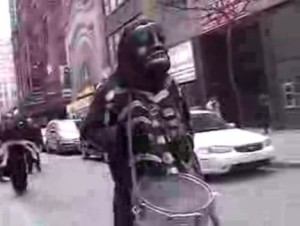
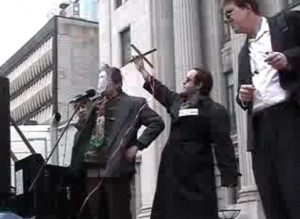
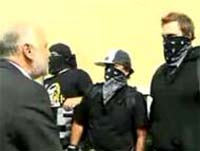

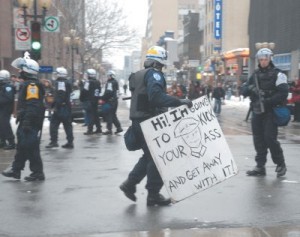
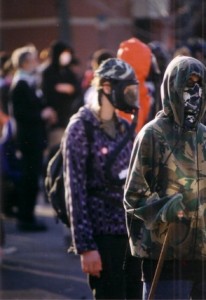

January 19th, 2009 at 8:59 am
There is a similar law in New York. It is along the lines of no one is allowed to wear a mask in public unless they are by themselves or on the way to or from a masquerade party. Ridiculous. There are creative ways around that law but the police had none of it.
January 21st, 2009 at 4:03 am
And just as the example used above, Danish activists has also met undercover police in demonstrations. And in at least one of these encounters, the policemen where actively trying to provocate and start riots…
We have also seen different “preventive arrests” based on this very law…
I am not sure what they would say about bodypaint, but it’s worth a try… 😉
February 8th, 2009 at 8:54 pm
If Muslim women can wear veils, costumed characters can wear masks,
and undercover police can wear masks, then why not protestors?
This law is unfair and a waste of taxpayers money to pass and enforce.
February 27th, 2009 at 9:02 am
[…] you thought that the City of Montreal postponing the vote on its controversial anti-mask bylaw would silence the amendment’s opponents, you’d only have to look to the streets Monday […]
March 16th, 2009 at 4:56 am
[…] with the police attempting to control the theatre in the streets, demanding the banning of masks and even making illegal certain types of discourse, script or language. Exacerbating these problems […]
April 8th, 2009 at 12:33 pm
[…] police, considering they have been petitioning the city to ban the use of theatrical costuming, in particular masks, at public protests. However the made-for-Afghanistan dress code seems to be in keeping with […]
April 17th, 2009 at 7:04 am
[…] that “repression is our job,” which is a philosophy that seems to have guided their attempts to ban masks at public protests and their actions at recent events such as the Anti-Police Brutality March and […]